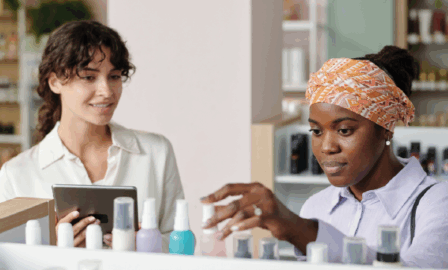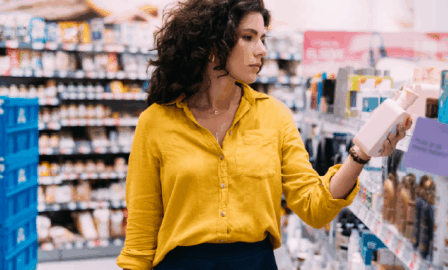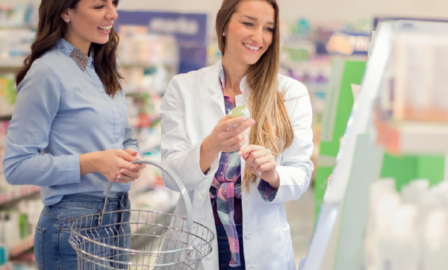Combating Counterfeit Cosmetics
While consumers are on a quest to find deals for their everyday purchases, both consumers and manufacturers are combating the impact of counterfeit products, including counterfeit cosmetics in the beauty industry.
The Counterfeit Challenge in the Consumer Products Industry
Many consumers regularly turn to trusted online retailers like Amazon, Walmart, and others to grab high-ticket items at a discount. However, how often are consumers presented with verification of the true source of the product they are purchasing? It is rare, and counterfeiting of consumer products remains on the rise. Unfortunately, the reach of counterfeit consumer products is global, with 84.5% of total product seizures originating in China and Hong Kong, and the United States leading as the country hit the hardest by the trade of fake goods representing 20% of the total value of seizures. Specific to perfume and cosmetics, global seizures of counterfeit product jumped 25% from 2011 to 2013, according to reports by the Organization for Economic Cooperation and Development (OECD). This blind trust for the safety and quality of imported beauty products have very real health risks.
The Impact of Counterfeit Cosmetics in the Beauty Industry
Roughly $1.4 billion in counterfeit consumer products were seized in 2016 by U.S. Customs. This included 2,000 shipments of counterfeit cosmetics products. The issue for counterfeit cosmetics and beauty products is that counterfeit products can have very real health risks, including eye infections or allergic reactions. Social media is flooded with unfortunate stories of unassuming consumers affected by serious side effects of counterfeit formulations. Details of these stories are jarring. Imported products purchased through untraditional outlets are testing positive for lead, mercury, arsenic, E. coli, and more. If these dangerous chemicals aren’t enough to scare away deal-hungry consumers, the conditions in which most of these products are made is alarming. It is difficult to believe an informed consumer would voluntarily put these “ingredients” on their body. Numerous accounts detail coveted cosmetic products (that are later found to be counterfeit) have glued consumers’ eyes shut, caused chemical burns, and at times causing permanent damage.
Between January 2004 and September 2017, 11,897 reports of adverse events related to cosmetics alone were reported to FDA’s Adverse Event Reporting System. While most events resulted in transient symptoms, 18 reports of adverse events resulted in death. It remains unclear how many of these occurrences could have been directly caused by counterfeit product.
Counterfeit Cosmetics Products and the Online Sales Channel
The loyal following created by heritage and start-up cosmetics brands alike have consumers seeking all avenues to get their hands on the latest products. Those seeking the enormously popular Kylie Cosmetic Lip Kits are undoubtedly barraged with deals from traditionally trustworthy channels. There are presently over 300 results on Amazon for Kylie Cosmetics, while the brand clearly states on their website that these products are sold exclusively on the company’s website. Looking at the reviews of these products, you’ll find comments stating that the products smell like gasoline or that the product caused their lips to burn or stick together. Third-party ecommerce retailers are having trouble preventing counterfeit products being sold on their sites, so manufacturers will need to step in to help.
While manufacturers are doing their best to protect their consumers from dangerous knock-offs (and their own brand equity from the effect these horror stories have on their business), consumers should not rely on 3rd-party retailers to guard against counterfeit product. These 3rd parties cannot guarantee a product is authentic, untampered, stored correctly, etc. Unfortunately, it is the manufacturer’s brands that get tarnished as negative consumer reviews on sites get attributed directly to the product listings and not the profiles of the sellers. Amazon is working to combat this issue and has strict anti-counterfeiting policies that can immediately shut down a seller’s operation. It’s not enough, however, as identical operations pop up in place of the ones that are shut down.
Beauty Consumers Beware
It is recommended that consumers keep in mind the following when shopping for beauty products:
- Purchase products from authorized retailers – visit each brand’s website for a listing of the retailers that you can trust
- Report encounters with counterfeit products directly to the manufacturer – virtually all major beauty manufacturers, like Estee Lauder, for example, are dedicating significant resources to this issue; be a part of the solution by alerting them to your situation
- Report serious adverse effects to the Food & Drug Administration – FDA recommends filing a report should you have a reaction after using a cosmetic or notice red flags with a product, like a bad smell, color change, signs of contamination, or foreign material in the product.
The Future for Cosmetics Manufacturers
Counterfeit products are costing the cosmetics industry roughly $75 million annually. The largest cosmetics manufacturers have dedicated tremendous resources to combating product divergence. Without meaningful changes across the industry’s supply chain, it seems counterfeiting will remain profitable in the marketplace and hazardous to consumers. It is not too soon to envision the consumer of the future fully protected by a harmonized and transparent supply chain, replete with overt and covert product authentication. As outlined in our post What Supply Chain Consultants are Advising about Artificial Intelligence, Blockchain, and Robotics, beauty manufacturers should begin experiments and proofs-of-concept in lab environments that explore the possibilities of blockchain coupled with the Internet of Things (IoT). Both are expected to further enable deep track and trace capabilities for beauty supply chains.
Co-author and contributions by Macy Zylstra



